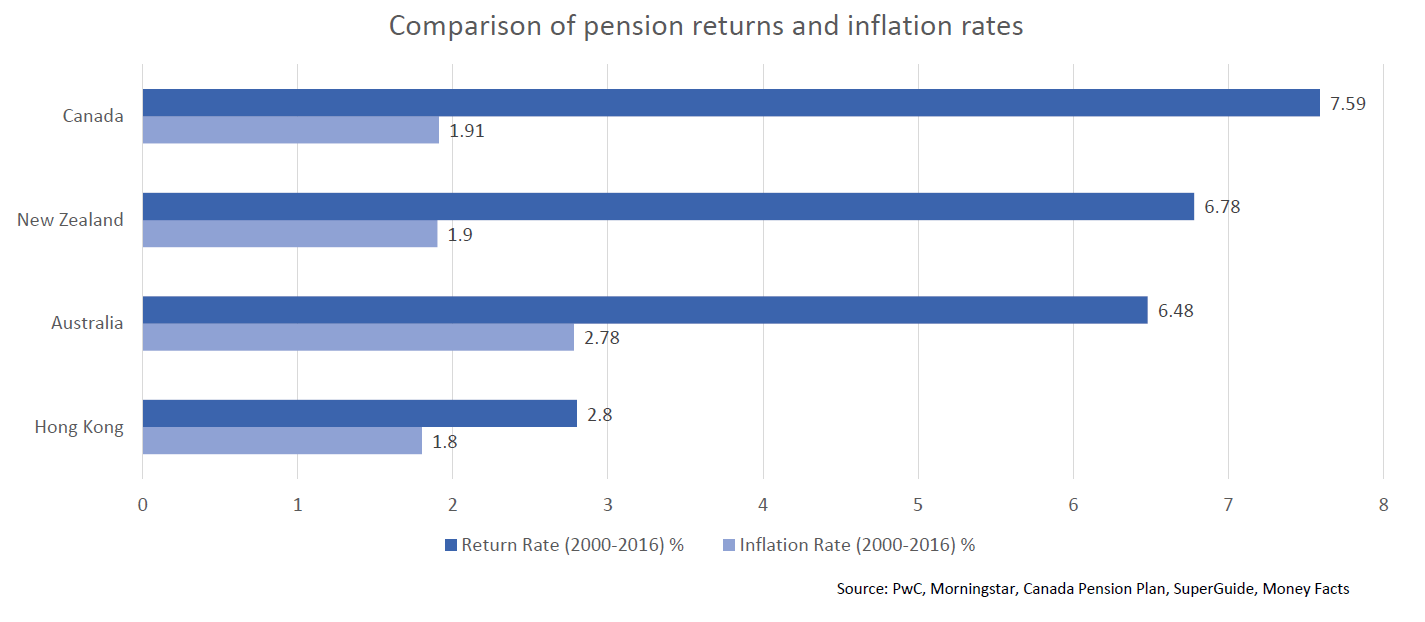INEFFICIENT administration processes resulting from paper-based systems are affecting the profit of Hong Kong’s retirement scheme, the Mandatory Provident Fund (MPF), according to a recent PwC report. The 16-year CAGR (compound annual growth rate) on all MPF funds is 2.8%, compared to 5% for the HSI over the same period.
Asia’s retirement schemes are faced with a rapidly aging population. Hong Kong is no exception. The proportion of the population aged 65 and above is estimated to reach 36% by 2064, an increase of 140% from 2014. This will put additional pressure on the MPF which is not generating satisfying returns.
The monthly return for each member of the Hong Kong MPF scheme was on average less than HK$3,000 in August, according to Hong Kong’s Mandatory Provident Fund Schemes Authority (MPFA). The 16-year CAGR for all MPF funds is 2.8%, compared 5% for the HSI over the same period. The fund expense ratio of the MPF is also higher than other countries with similar pension schemes such as the US, Australia, Mexico, and Chile. The rate of return also compares unfavourably to other pension funds in Canada, New Zealand and Australia, according to the report.

“About one third of the fees relate to investment management fees, which means potentially up to two-thirds of that relates to administrative costs,” says Albert Lo, finance consulting partner of PwC, Hong Kong. “There is a direct relationship between the potentially higher administrative costs, with the very much paper-based system in Hong Kong, for the MPF,” adds Lo. “For example, out of the 30 million (Hong Kong dollar) annual transactions that were done within the MPF scheme, 65% of them are paper-based transactions.”
This is a major shortcoming for the MPF. The high fees resulting from the inefficient administration processes and the layering of investments affect the returns of the MPF. The PwC report calls for a centralized database which provides a traceable record of all MPF members on a single platform shared by service providers, members, regulators and government departments, such as the Inland Revenue Department.
There are 18 MPFA-approved trustees for the MPF in Hong Kong. Each MPF member has three different accounts on average, says Marie-Anne Kong, asset and wealth management leader at PwC Hong Kong. “That creates costs,” comments Peter Craughwell, partner in pensions management consulting at PwC UK, noting that a centralized system can bring together all the different channels and administrators. “In other countries, we see one single administrator looking after 12 million members. And therefore, those members receive exactly the same service,” says Craughwell.
MPF’s shortcomings also include a one-size-fits-all approach and low levels of engagement among members, according to PwC’s report. “It is currently far too dependent on paper processes. This pushes up costs and doesn’t enable members to track their investments easily,” says Lo.
“The consumer behavior is changing. Technology usage is fast growing,” adds Kong. By introducing new technologies, the centralized database can be used to streamline the on-boarding process via a know your client utility, which will provide faster and more efficient on-boarding and improve engagement with MPF members. MPFA plans to set up the eMPF system this year. This centralized administration on an electronic platform is said to improve the user experience and the administrative efficiency.
“We also fully recognize that the policymakers have made huge effects to improve various aspects,” says Kong, noting that now is an important time for the entire industry to contribute some ideas to shape the coming eMPF. “But for members to have confidence in the pension system, faster progress needs to be made,” adds Kong.








